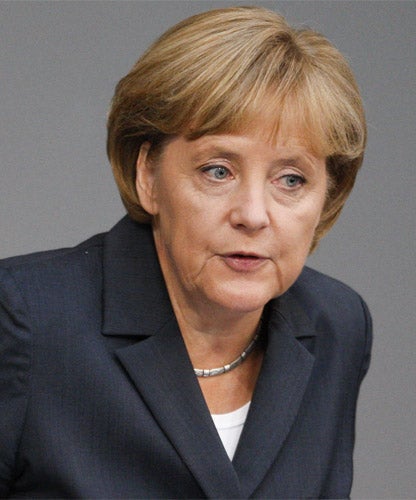Don't rush to judge German commander, Merkel pleads

The German Chancellor Angela Merkel has rushed to defend her government's military engagement in Afghanistan in the wake of a Nato air strike last week that turned into the deadliest operation involving German forces since the Second World War.
Just over a fortnight before federal elections and amid growing nervousness in Ms Merkel's coalition about her country's shifting role from peacekeepers to belligerents in Afghanistan, the Chancellor used a special session of parliament to firmly reject criticism from other Nato countries and opposition parties at home.
There has been a growing clamour since a German commander called in the air strike on 4 September against two fuel trucks which had been hijacked by the Taliban, leading to the deaths of some 70 civilians.
The Germans, eager to stay away from combat on the increasingly unpopular mission in Afghanistan, have been on high alert for possible suicide attacks amid fears that violence against their soldiers could influence their general election later this month. The Berlin government has also faced critical questions inside Nato for calling in the US F-15 fighter jet to destroy the fuel trucks near Kunduz.
"I will not stand for any of that – neither in Germany or abroad," Ms Merkel told parliament, adding she had delivered a sternly worded message to Nato secretary general Anders Fogh Rasmussen. "I let him know that very clearly." Ms Merkel said she "deeply regretted" the loss of innocent lives – a notably softer stance than that of her Defence Minister Franz-Josef Jung, who had at first insisted repeatedly that only Taliban insurgents had been killed. "We will not gloss over anything," Ms Merkel said. "But we will not accept any premature condemnation either."
The Afghan President, Hamid Karzai, has criticised the attack, telling a French newspaper that he did not understand why a fighter jet was used to bomb the fuel trucks at the risk of so much loss of life. "What an error of judgement!" he said. "More than 90 dead all because of a simple lorry that was immobilised in a river bed. Why didn't they send in group troops to recover the fuel tank?" With prosecutors in Potsdam considering opening a criminal investigation into the decision to call in the air strike, pressure has been mounting on Mr Jung.
A deeply pacifist country, Germany only cautiously began deploying troops abroad in UN peacekeeping missions in the 1990s. That Germany was involved in an attack with so many civilian casualties – something Berlin's leaders have long criticised others for – is sure to boost the volume of domestic opposition to the conflict. Already two-thirds of Germans tell pollsters they want German troops to come home.
Germany has the third largest contingent of Nato troops, at 4,200. The Berlin government has regularly turned a deaf ear to calls from Nato allies to do more heavy lifting in combat operations in the south.
Subscribe to Independent Premium to bookmark this article
Want to bookmark your favourite articles and stories to read or reference later? Start your Independent Premium subscription today.

Join our commenting forum
Join thought-provoking conversations, follow other Independent readers and see their replies